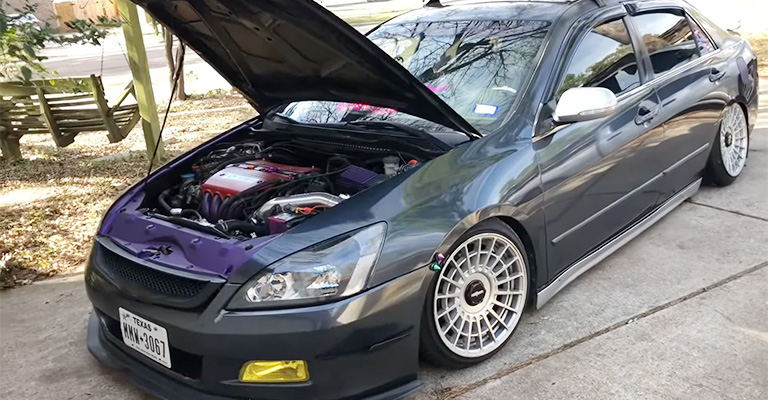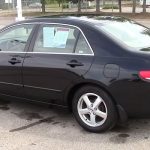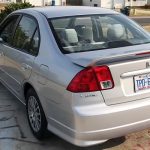The 2005 Honda Accord is a popular mid-size sedan that was produced by the Honda Motor Company. While the 2005 Accord is generally considered a reliable and well-built vehicle, it is not immune to problems.
Some of the most common issues reported by owners of 2005 Honda Accords include transmission problems, suspension issues, and problems with the electrical system.
In this article, we will take a closer look at some of the most common problems that have been reported with the 2005 Honda Accord, as well as some potential solutions for these issues.

2005 Honda Accord Problems
1. “No Start” Due to Ignition Switch Failure
This problem occurs when the ignition switch fails, preventing the car from starting. Owners have reported that the car will not start, or that it will start and then immediately stall.
In some cases, the problem may be caused by a faulty ignition switch, while in other cases it may be caused by a problem with the electrical system or a faulty starter motor.
2. Check Engine and D4 Lights Flashing
This problem is characterized by the check engine and D4 lights flashing on the dashboard. The check engine light is a warning indicator that is used to alert the driver to a problem with the car’s engine or emissions control system. The D4 light is an indicator for the transmission.
When both of these lights are flashing, it can indicate a problem with the car’s engine or transmission.
3. Radio/Climate Control Display May Go Dark
This problem occurs when the display for the radio and climate control system goes dark or becomes difficult to read. This can be caused by a variety of issues, including problems with the display itself, problems with the electrical system, or issues with the car’s wiring.
In some cases, the problem may be resolved by replacing the display or repairing the wiring, while in other cases it may require more extensive repairs.
4. Faulty Door Lock Actuator May Cause Power Door Locks to Activate Intermittently
The door lock actuator is a small electric motor that is responsible for controlling the power door locks on a car. If the actuator fails, it can cause the power door locks to activate intermittently or not at all.
This can be a frustrating problem for drivers, as it can make it difficult to lock or unlock the doors of the car. In some cases, the problem may be resolved by replacing the faulty actuator, while in other cases it may require more extensive repairs.
5. Warped Front Brake Rotors May Cause Vibration When Braking
The brake rotors on a car are responsible for providing a smooth and consistent surface for the brake pads to press against. If the rotors become warped or damaged, it can cause a vibration when the brakes are applied.
This can be a dangerous problem, as it can make it difficult to control the car while braking. In most cases, the problem can be resolved by replacing the warped rotors.
6. Air Conditioning Blowing Warm Air
This problem occurs when the air conditioning system is not properly cooling the air. This can be caused by a variety of issues, including problems with the compressor, leaks in the refrigerant system, or a faulty thermostat.
In some cases, the problem can be resolved by replacing a faulty component or sealing a leak, while in other cases it may require more extensive repairs.
It is important to address this problem as soon as possible, as driving with a faulty air conditioning system can be
uncomfortable and can also cause other problems, such as fogged windows or a build-up of condensation on the windows.
7. Front Compliance Bushings May Crack
The compliance bushings on a car are small rubber or rubber-like components that are used to isolate the suspension from the rest of the car. If these bushings crack or fail, it can cause problems with the car’s handling and stability.
Some common symptoms of faulty compliance bushings include noise and vibration when driving, as well as a loose or unstable feeling when turning. In most cases, the problem can be resolved by replacing the faulty bushings.
8. Driver’s Door Latch Assembly May Break Internally
The door latch assembly is responsible for holding the door closed and allowing it to be opened. If the latch assembly breaks internally, it can cause the door to become stuck or difficult to open.
This can be a frustrating problem for drivers, as it can make it difficult to enter or exit the car. In most cases, the problem can be resolved by replacing the faulty latch assembly.
9. Bad Engine Mounts May Cause Vibration, Roughness, and Rattle
The engine mounts on a car are responsible for securing the engine to the frame of the car. If the mounts become worn or damaged, it can cause the engine to vibrate or move excessively, leading to roughness and rattle when driving.
This can be a dangerous problem, as it can make it difficult to control the car and can also cause other problems, such as leaks or damage to the engine. In most cases, the problem can be resolved by replacing the faulty engine mounts.
10. Problems Shifting Into 3rd Gear
Some owners of 2005 Honda Accords have reported problems shifting into third gear. This can be caused by a variety of issues, including problems with the transmission itself, problems with the shift linkage, or issues with the engine.
In some cases, the problem may be resolved by replacing a faulty component or adjusting the shift linkage, while in other cases it may require more extensive repairs. It is important to address this problem as soon as possible, as driving with a faulty transmission can be dangerous and can also cause further damage to the car.
11. Bad Rear Hub/Bearing Unit
The hub and bearing unit is a component of the car’s suspension system that is responsible for supporting the weight of the car and allowing the wheels to rotate. If the unit becomes worn or damaged, it can cause problems with the car’s handling and stability.
Some common symptoms of a bad rear hub/bearing unit include noise and vibration when driving, as well as a loose or unstable feeling when turning. In most cases, the problem can be resolved by replacing the faulty unit.
12. Clock Light May Burn Out
Some owners of 2005 Honda Accords have reported that the light for the clock on the dashboard burns out or becomes difficult to see.
This can be a frustrating problem, as it can make it difficult to read the time. In most cases, the problem can be resolved by replacing the faulty light or adjusting the display.
13. Leaking Gaskets May Allow Water into Tail Light Assembly
The gaskets on a car are responsible for sealing various components and systems to prevent leaks. If a gasket becomes worn or damaged, it can allow water to enter the car’s tail light assembly. This can cause the tail lights to malfunction or stop working altogether.
In most cases, the problem can be resolved by replacing the faulty gasket and sealing the leak.
14. Check Engine Light for Running Rough and Difficulty Starting
Some owners of 2005 Honda Accords have reported that the check engine light comes on when the car is running rough or having difficulty starting. This can be caused by a variety of issues, including problems with the engine, problems with the fuel system, or issues with the car’s emissions control system.
In some cases, the problem may be resolved by replacing a faulty component or making an adjustment, while in other cases it may require more extensive repairs.
15. Check Engine Light Due to Failed Air Fuel Sensor or Oxygen Sensor
The air fuel sensor and oxygen sensor are two important components of a car’s emissions control system. These sensors are responsible for monitoring the air-fuel ratio in the engine and helping the car to run efficiently.
If either of these sensors fails, it can cause the check engine light to come on. In most cases, the problem can be resolved by replacing the faulty sensor.
Possible Solution
| Problem | Possible Solution |
| “No Start” Due to Ignition Switch Failure | Replace ignition switch or repair electrical system or starter motor |
| Check Engine and D4 Lights Flashing | Repair engine or transmission problem |
| Radio/Climate Control Display May Go Dark | Replace display or repair wiring |
| Faulty Door Lock Actuator May Cause Power Door Locks to Activate Intermittently | Replace door lock actuator |
| Warped Front Brake Rotors May Cause Vibration When Braking | Replace warped brake rotors |
| Air Conditioning Blowing Warm Air | Repair or replace faulty compressor, refrigerant system, or thermostat |
| Front Compliance Bushings May Crack | Replace faulty compliance bushings |
| Driver’s Door Latch Assembly May Break Internally | Replace faulty door latch assembly |
| Bad Engine Mounts May Cause Vibration, Roughness, and Rattle | Replace faulty engine mounts |
| Problems Shifting Into 3rd Gear | Repair or replace faulty transmission, shift linkage, or engine |
| Bad Rear Hub/Bearing Unit | Replace faulty rear hub/bearing unit |
| Clock Light May Burn Out | Replace faulty clock light or adjust display |
| Leaking Gaskets May Allow Water into Tail Light Assembly | Replace faulty gasket and seal leak |
| Check Engine Light for Running Rough and Difficulty Starting | Repair or replace faulty engine, fuel system, or emissions control components |
| Check Engine Light Due to Failed Air Fuel Sensor or Oxygen Sensor | Replace faulty air fuel sensor or oxygen sensor |
2005 Honda Accord Recalls
| Recall Number | Recall Issue |
| 19V501000 | Newly Replaced Passenger Air Bag Inflator Ruptures During Deployment Spraying Metal Fragments |
| 19V499000 | Newly Replaced Driver’s Air Bag Inflator Ruptures During Deployment Spraying Metal Fragments |
| 19V182000 | Driver’s Frontal Air Bag Inflator Ruptures During Deployment Spraying Metal Fragments |
| 18V268000 | Front Passenger Air Bag Inflator Potentially Installed Improperly During Replacement |
| 16V178000 | Passenger Frontal Air Bag Does Not Fully Deploy In A Crash |
| 15V370000 | Front Passenger Air Bag Defective |
| 15V320000 | Driver’s Front Air Bag Defective |
| 14V700000 | Front Airbag Inflator Module |
| 14V353000 | Front Airbag Inflator Module |
| 07V001000 | Honda Recalls 2004-2005 Accords Due to Problem with Seat Position Sensor |
Recall 19V501000:
This recall was issued for certain 2005 Honda Accords due to a problem with the passenger air bag inflator. The inflator could potentially rupture during deployment, spraying metal fragments into the car. This could cause serious injury or death to the occupants of the car.
Recall 19V499000:
This recall was also issued for certain 2005 Honda Accords due to a problem with the driver’s air bag inflator. The inflator could potentially rupture during deployment, spraying metal fragments into the car. This could cause serious injury or death to the occupants of the car.
Recall 19V182000:
This recall was issued for certain 2005 Honda Accords due to a problem with the driver’s frontal air bag inflator. The inflator could potentially rupture during deployment, spraying metal fragments into the car. This could cause serious injury or death to the occupants of the car.
Recall 18V268000:
This recall was issued for certain 2005 Honda Accords due to a problem with the front passenger air bag inflator. The inflator could potentially be installed improperly during replacement, which could cause the air bag to deploy improperly in the event of a crash.
This could increase the risk of injury to the occupants of the car.
Recall 16V178000:
This recall was issued for certain 2005 Honda Accords due to a problem with the passenger frontal air bag. The air bag may not fully deploy in the event of a crash, which could reduce the level of protection it provides. This could increase the risk of injury to the occupants of the car.
Recall 15V370000:
This recall was issued for certain 2005 Honda Accords due to a problem with the front passenger air bag.
Problems and Complaints Sources
https://repairpal.com/2005-honda-accord/problems
All Honda Accord years we talked –




